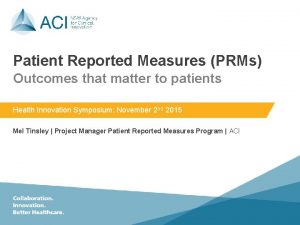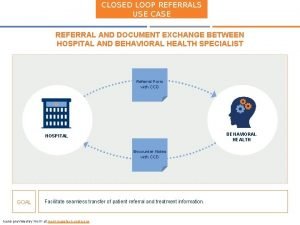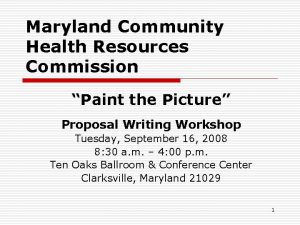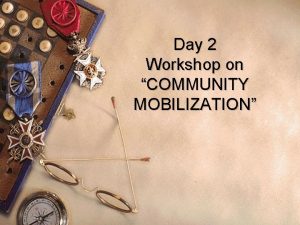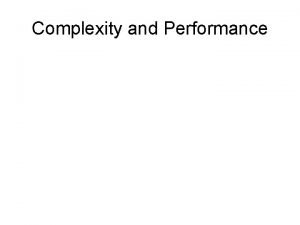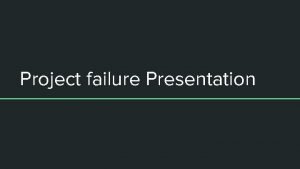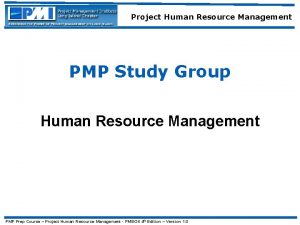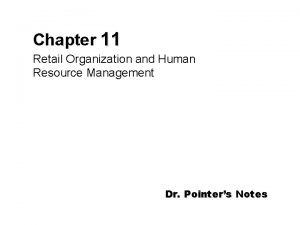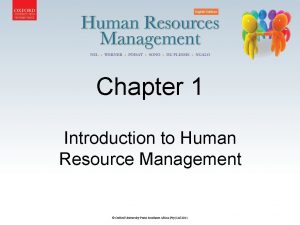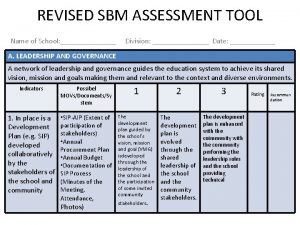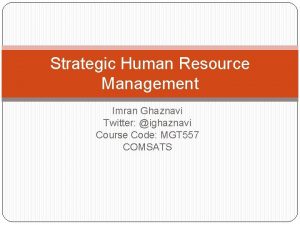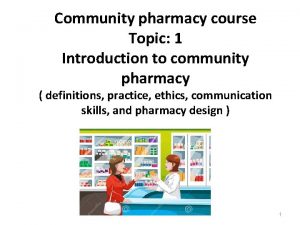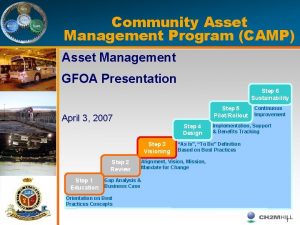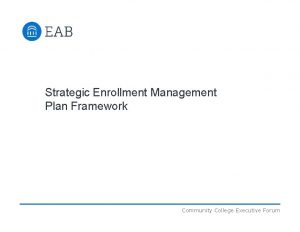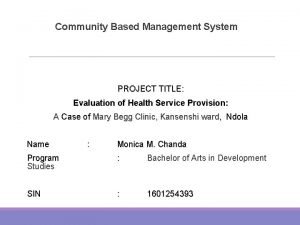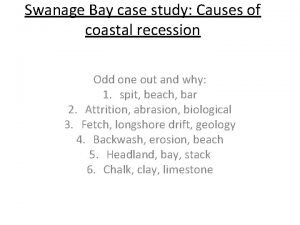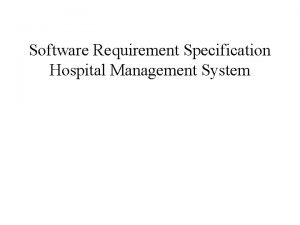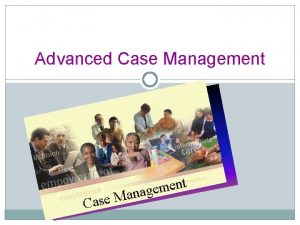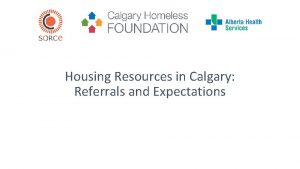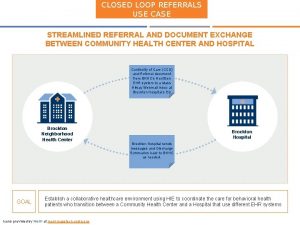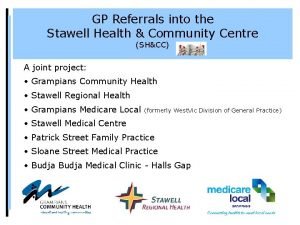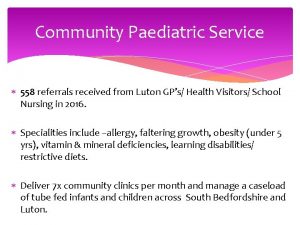Case Management 5 Referrals to community resources SHSV


























































- Slides: 58

Case Management 5. Referrals to community resources SHSV 120 Rex Rempel, LICSW

Homework Ch. 5 due before class May 2 nd

May 4 th Katie Viola Coordinator, Basic Food, Employment, and Training Director of Student Development Advising, Counseling, Disability Support, Student Conduct

May 11 th CM class project Updating resource information for

May 15 th 9: 00 -12: 00 Interprofessional Collaboration & Patientcentered care

May 23 rd Letha Myers -- Vol. Manager

Assessments, with Cloie Johnson May 25 th 10: 30 Rehabilitation Counselor/Case Manager at OSC Vocational Systems, Inc Rehabilitation Counselor/Case Manager at Intracorp Behavioral Science Specialist, US Army Masters of Education, Whitworth University BA Liberal Studies, University of the State of New York AAS Human Services, University of Maine

Group exercise: What kind of help is available in King County to people in need?

5. 2 Finding needed resources How can you find good help for your client? Where can you get the information you need? 4 ideas from each group

5. 5 Strokes

5. 5 Aftercare for strokes

Group research: What problems to stroke survivors have? What are their needs?

Think: What does it take for stroke survivors to leave the hospital? What do they need in place?

Group research: What local supports are there for stroke survivors?

5. 6 What resources do you recommend? Why?

May 4 th Katie Viola Coordinator, Basic Food, Employment, and Training Director of Student Development Advising, Counseling, Disability Support, Student Conduct

Group exercise: What kind of help is available in King County to people in need?

5. 1 Service systems • AIDS/HIV Resources • Mental Health Resources • Alcohol/Drug Abuse Treatment • Minority Resources, including • Resources for Domestic Violence • Resources for Offenders and Ex- Resources • Education/Training • Resources for the Elderly resources for non-English speakers Offenders • Resources for People with Physical Disabilities • Employment Resources • GLBTQ resources • Financial Resources • Transportation Services • Food Banks and Food Resources • Resources for Veterans • Legal/Jail Information and Resources • Vocational programs • Medical, Dental, and Vision Resources • Resources for Youth

Client experiences of service systems • AIDS/HIV Resources • Mental Health Resources • Alcohol/Drug Abuse Treatment • Minority Resources, including • Resources for Domestic Violence • Resources for Offenders and Ex- Resources • Education/Training • Resources for the Elderly resources for non-English speakers Offenders • Resources for People with Physical Disabilities • Employment Resources • GLBTQ resources • Financial Resources • Transportation Services • Food Banks and Food Resources • Resources for Veterans • Legal/Jail Information and Resources • Vocational programs • Medical, Dental, and Vision Resources • Resources for Youth

Relationships between service systems • AIDS/HIV Resources • Mental Health Resources • Alcohol/Drug Abuse Treatment • Minority Resources, including • Resources for Domestic Violence • Resources for Offenders and Ex- Resources • Education/Training • Resources for the Elderly resources for non-English speakers Offenders • Resources for People with Physical Disabilities • Employment Resources • GLBTQ resources • Financial Resources • Transportation Services • Food Banks and Food Resources • Resources for Veterans • Legal/Jail Information and Resources • Vocational programs • Medical, Dental, and Vision Resources • Resources for Youth

5. 2 Finding needed resources How can you find good help for your client? Where can you get the information you need? 4 ideas from each group

5. 2 Sources of resource information

5. 3 Things to consider about resources • Outdated information • Eligibility criteria • Limits on resources • Location • Client ability to understand & use the resource

DAP practice Write a DAP note for today’s class

5. 4 Group exercise: Practice finding needed resources Who is in need? What do they need? • Age • Diapers • Racial identity • A ride to church • Gender identity • Wheelchair ramp • Language • Medical insurance • Sexual orientation • Divorce • Zip code • Protection order • Income • HIV medication • Physical health • School supplies • Mental health • Anxiety reduction • Legal status etc. , etc.

May 11 th CM class project Updating resource information for

May 15 th 9: 00 -12: 00 Interprofessional Collaboration & Patientcentered care

Case Management Intake interviews SHSV 120 Rex Rempel, LICSW

Homework: Read Chapters 14 -16 before class on May 9 th

Assignment: compare/contrast agencies’ intake processes due May 17 th

Team collaboration on intakes 1. What is the purpose of an intake? 2. How much of the client’s life does it cover? 3. What is included?

What needs to happen during intake? • Tuning in • Documentation • Welcoming • Assessment • Screening for • Goal setting & • Match • Follow-up eligibility • Information gathering care planning

Assignment: mock intake assessment due May 20 th

What did you find in the intake forms? What do you think of them?

Listening, responding & asking questions • Active listening • Broad to specific • Checking accuracy • Summarizing • Asking permission to inquire • Asking permission to share ideas

Raising difficult topics • Why to ask • Why not to ask • Confrontation vs. collaboration

Case Management Assessments SHSV 120 Rex Rempel, LICSW

Definitions • Psychological: pertaining to the mind • Psychosocial: referring to the relationship between a person’s psychology and their social environment. • Psychosocial assessment: an evaluation of a person's mental health, social stat us, and functional capacity. The purpose of a psychosocial assessment is to clearly articulate specific problems in a person’s life that may have a physical or psychological impact.

Definitions • Biopsychosocial assessment: a series of questions asked at the beginning of treatment to obtain information about the major physical (bio), psychological (psycho), and social issues of the individual. This approach is called holistic because it posits that separate issues are often related.

Examples of biopsychosocial assessments to help you with your assignment 1. Summers text, pages 263 -265 2. Social worker exam review: http: //socialworkexamreview. blogspot. com/201 0/11/24 -biopsychosocial-assessmentexample. html 3. Therapist private practice: http: //therapistprivatepractice. com/biopsychoso cial-assessment/ 4. From an intern: https: //seelio. com/w/9 ra/developing-abiopsychosocial-assessment

Definitions • Person-in-environment approach: understanding an individual and their behavior in light of their environmental contexts: their social circle, political realities, familial situations, generation, point in history, spiritual life, economics, and more. The premise: where, when, and how you live impacts your health and behavior.

Person-in-environment approach

DAP practice Write a DAP note for today’s class

May 23 rd Letha Myers -- Vol. Manager

Where can I find help for my client? Letha Myers, Manager @ Crisis Clinic

• • • Alcohol/drug history Intake content Educational background Vocational information Family, friends and social supports Life-style information Living situation Income / benefits / finances Health Spiritual / religious activity Mental status Strengths and weaknesses Problems and needs for development of a treatment plan ØComplete required documents for admission to a program ØObtain appropriately signed consents when soliciting from or providing information to outside sources to protect client confidentiality and rights

Writing a social history • Past & current life experience • Development • Purposes • Critical events • Shows individuals view of self • Helps predict future behavior • Identifies causes • Identifies resources & barriers • Significant people & groups • Family • Friends • School • Job • Formal supports & treatment providers • Sex • Drugs • Medical • Psychiatric • Legal • Education • Employment • Recreation

from Rex’s work in home health

Homework: read Chapter s 21 & 26 before class on June 1 st

Assessments, with Cloie Johnson May 25 th 10: 30 Rehabilitation Counselor/Case Manager at OSC Vocational Systems, Inc Rehabilitation Counselor/Case Manager at Intracorp Behavioral Science Specialist, US Army Masters of Education, Whitworth University BA Liberal Studies, University of the State of New York AAS Human Services, University of Maine

Assessments, with Cloie Johnson Topics might include: • What is the purpose of an intake? • What is included? What subjects does it cover? • What needs to happen during an intake/at the start of services? • What skills does it take? • How do you raise difficult (personal, sensitive) topics? • How do you write up an assessment?

Making meaning • What is important? What should we know about them? • Why is it important? • What explanations for their situation did we consider? Could be… • What best explains the situation? Seems to be…

What goes into an assessment? • Check your textbook for suggestions and • Severity • Significance • Likely results • Current condition • Possibility for • Causes • Needs • Wants successful treatment/change • Risks • Strengths

What goes into an assessment? • Client name (use a fake name) • Presenting problem or problems • Social history • Mental health/psychiatric history • Medical health/medical history • Substance use history • Cultural and spiritual values • Legal history • Financial standing • Strengths, supports & available resources • Anything else that appears important to • Education & employment understanding the individual history

Case Management Teamwork SHSV 120 Rex Rempel, LICSW

Sharing feedback, taking feedback When giving feedback • No labels, no names • No mindreading • Compliment • Express your feelings • Try to explain why • Be specific • Be honest Receiving feedback • Listen. Just listen. • Do not defend, explain, or justify • Ask questions for clarification • Thank them • Look for ways to benefit from this

Feedback 2 assignment in Canvas due May 30 th • What did your teammates tell you about your work this second month? • What have you done well? • What should you improve? • How did they rate your performance, from 0 to 50?

DAP practice Write a DAP note for today’s class
 Prms referrals
Prms referrals Closed loop referrals
Closed loop referrals Types of referrals in health and social care
Types of referrals in health and social care Best case worst case average case
Best case worst case average case What is transforming resources
What is transforming resources Fixed resources
Fixed resources Renewable resources vs nonrenewable resources
Renewable resources vs nonrenewable resources Chapter 2 skills and applications
Chapter 2 skills and applications Mchrc
Mchrc Prepare to scale up in community mobilization
Prepare to scale up in community mobilization Mountain view community hospital case study
Mountain view community hospital case study Long case vs short case
Long case vs short case Worst case and average case of binary search tree
Worst case and average case of binary search tree Glennan building cwru
Glennan building cwru Bubble sort best case and worst case
Bubble sort best case and worst case Foxmeyer erp failure case study
Foxmeyer erp failure case study Bubble sort best case and worst case
Bubble sort best case and worst case Bubble sort best case and worst case
Bubble sort best case and worst case Ambiguous case
Ambiguous case Human resource histogram
Human resource histogram Pmp roles and responsibilities
Pmp roles and responsibilities Human resources and job design
Human resources and job design Importance of personnel management
Importance of personnel management Empower human resources
Empower human resources What is hrm
What is hrm Chapter 9 human resource management
Chapter 9 human resource management Human resource management question paper
Human resource management question paper Hrm in retail management
Hrm in retail management Human resource management lecture chapter 1
Human resource management lecture chapter 1 Weiterbildung human resources management
Weiterbildung human resources management Human resource management gaining a competitive advantage
Human resource management gaining a competitive advantage Family resources definition
Family resources definition Chapter 9 human resources management
Chapter 9 human resources management Cavendish management resources
Cavendish management resources Revised sbm assessment tool 2021
Revised sbm assessment tool 2021 Nature of human resource management
Nature of human resource management Time management human resources
Time management human resources Human resource audit
Human resource audit Concept of human resource management
Concept of human resource management Information resources
Information resources Human resources management
Human resources management Ittpr
Ittpr Human resource and payroll cycle
Human resource and payroll cycle The role of psychology in human resources management
The role of psychology in human resources management Pyramid levels of management
Pyramid levels of management Management pyramid
Management pyramid Middle level management
Middle level management International community management
International community management Enrollment management models community colleges
Enrollment management models community colleges The apprentice pharmacist
The apprentice pharmacist Community asset management
Community asset management Enrollment management plan template
Enrollment management plan template Community based management system
Community based management system Iris ayala
Iris ayala Swanage bay facts
Swanage bay facts Strength based case management
Strength based case management Srs document for e healthcare system
Srs document for e healthcare system Software engineering use case
Software engineering use case Performance management
Performance management
